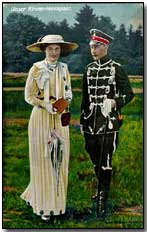Primary Documents - Crown Prince Wilhelm on the Battle of Verdun, 21 February 1916
 Reproduced below is
Crown
Prince Wilhelm's summary of the German offensive
launched
against French-held Verdun on 21 February 1916.
Reproduced below is
Crown
Prince Wilhelm's summary of the German offensive
launched
against French-held Verdun on 21 February 1916.
Wilhelm headed the Verdun offensive, appointed to the task by German Army Chief of Staff Erich von Falkenhayn. Often described as the greatest battle of the war, casualties on both sides were immense. Falkenhayn's stated intention was to "bleed France white" in the latter's defence of Verdun.
Such virtually proved to be the case - although the scale of German losses brought Falkenhayn much criticism. Indeed the failure to capture Verdun ultimately resulted in Falkenhayn's removal as Chief of Staff and Paul von Hindenburg's installation (along with Erich Ludendorff). The Crown Prince was himself subsequently described as "the butcher of Verdun" for his role in the battle.
In his summary (below) Wilhelm argued that once the initial element of surprise had been lost victory for the Germans was unattainable, and that he advocated an abandonment of the attack - a recommendation which was ignored by Falkenhayn.
Click here to read Falkenhayn's justification for the offensive. Click here to read Crown prince Wilhelm's summary of its abandonment. Click here to read von Hindenburg's decision to call off the offensive. Click here to read Erich Ludendorff's dismissive view of the battle. Click here to read Joseph Joffre's August 1916 summary of the battle. Click here to read British newspaper baron Lord Northcliffe's despatch during the early days of the battle. Click here to read a French memoir of the German attack on Le Mort Homme in May 1916. Click here for a memoir of the struggle for Fort Douaumont the same month. Click here for a memoir of the German assault upon Fort Vaux in June 1916. Click here to read General Millerand's official account of the see-saw fighting at Thiaumont in July and August 1916. Click here to read a semi-official German historian's account of the end of the battle. Click here to read General von Zwehl's memorandum issued immediately before the French recapture of Forts Vaux and Douaumont. Click here to read Ludendorff's statement regarding the loss of Forts Vaux and Douaumont. Click here to read French General Pierre Dubois's view of the German approach at Verdun. Click here to read a French staff officer's account of the recapture of Fort Douaumont in October 1916.
Crown Prince Wilhelm on the Battle of Verdun
The attack on Verdun began on February 21st, 1916, and the huge successes of the first three days are well known.
The infantry of the Third, Eighteenth and Seventh Reserve Corps performed marvels of courage. The taking of Fort Douaumont crowned everything. Indeed, we should, after all, have succeeded in rushing the entire east front of Verdun, if the reserves promised us had arrived on time. Why they failed to do so is not within my knowledge.
I was told by Captain von Brandis, who stormed Fort Douaumont, that, on the fourth day, he had observed a complete absence of Frenchmen in the whole district of Douaumont-Souville-Tavannes. But our own troops had exhausted their strength; the weather was horrible, and rations could not everywhere be brought up as needed.
That it would have been possible to take the entire east front of Verdun by at once continuing the attack is clear from the fact that the local leaders of the French had already ordered the evacuation. Only later was this order countermanded by General Joffre.
The fatigue of our troops after a huge military performance and the lack of reserves despoiled us of the prize of victory. I bring no accusation; I merely record the fact.
From that day onward, surprises were no longer possible; and the early impetuous advances by storm gave place to a gigantic wrestle and struggle for every foot of ground. Within a few weeks, I perceived clearly that it would not be feasible to break through the stubborn defence, and that our own losses would ultimately be quite out of proportion to the gains.
Consequently, I soon did everything in my power to stop the attacks; and I repeatedly gave expression to my views and the deductions to be drawn from them. In this matter I stood somewhat opposed to my then Chief of Staff, General Schmidt von Knobelsdorf, and my representations were at first put aside; the orders ran, "Continue to attack."
Source: Source Records of the Great War, Vol. IV, ed. Charles F. Horne, National Alumni 1923
A 'Tracer' was a phosphorescent machine-gun bullet which glowed in flight, indicating course as an aid to artillery.
- Did you know?
